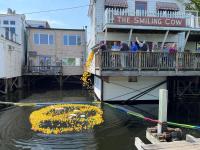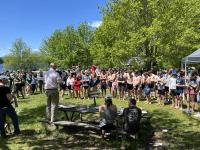Mitchell Center to host third annual Maine Food Waste Solutions Summit, April 14
The Maine Food Waste Solutions Summit, Maine’s annual food waste education event, is scheduled for Friday, April 14, from 10 a.m. to noon, via Zoom. The event is free and open to the public. Registration is required.
Food waste has economic, social, environmental and climate impacts. Nearly 40% of food produced in the U.S. is never eaten, costing the country $285 billion in 2019. Nationwide, $5 million per day is spent on food that is wasted in schools. In Maine, 97% of food waste goes to landfills, contributing to harmful pollution and climate change. Meanwhile, 1 in 8 adults and 1 in 5 children in Maine go hungry every day.
"Food waste is a major financial, social and environmental problem that impacts all Maine people, but the great news is that there are simple solutions," says Susanne Lee, faculty fellow at the Senator George J. Mitchell Center for Sustainability Solutions at the University of Maine. "We host this free online event so that everyone can attend and learn to reduce wasted food."
The summit brings together key food system participants—residents, farms, food businesses, charitable food partners, community leaders, nonprofits and state representatives—to learn about Maine’s food waste problem and solutions.
This year’s keynote speakers include Claudia Fabiano from the Environmental Protection Agency’s “Food: Too Good To Waste” peer network and Congresswoman Chellie Pingree, Maine First District Representative, a leading sponsor of bi-partisan legislation to help end food waste. Linda Breggin and Margaret Badding from the Environmental Law Institute will also present about the connection between food waste and climate change, and how communities can work to solve both at the same time.
The “MaineSuccess Stories” segment will recognize inspiring food waste initiatives across the state. Leaders from Preble Street Food Security Hub, Scrap Dogs Community Compost and Hannaford’s Zero Food Waste program will detail their food waste solutions.
A highlight of the summit is the presentation of the latest food waste pilot solutions by Mitchell Center student interns. Students Halle Rogers, Andrew MacMaster, Kate Flynn, Eddie Nachamie and Hannah Mathieu will talk about reducing, recovering, and recycling food waste with key stakeholder partners including Northern Light Health, Rockland AIO Food Pantry, Maine Dept. of Corrections and select Maine elementary schools in Buxton, Lisbon, Orono and Sebago.
As first-year food waste intern Eddie Nachamie explains, “Our stakeholder-driven research process really teaches you to integrate multiple perspectives in order to develop successful solutions to food waste. Seeing our solutions in action and measuring their real-world impact – that’s a unique and exciting aspect of this internship.”
The third annual Maine Food Waste Solutions Summit is hosted by the Mitchell Center and Food Rescue MAINE. This online event is free and open to the public. Register online by April 7 to receive Zoom connection information.
For more information or to request a reasonable accommodation, contact Susanne Lee at susanne.lee@maine.edu.
About the Senator George J. Mitchell Center for Sustainability Solutions: The Mitchell Center for Sustainability Solutions at the University of Maine aspires to be a leader and valued partner in understanding and solving problems related to the growing challenge of improving human well-being while protecting the environment. We collaborate with diverse stakeholders and bring together faculty and students from many different fields. By connecting knowledge with action, we seek to create a brighter environmental, social and economic future in and beyond Maine.
About the University of Maine: The University of Maine, founded in Orono in 1865, is the state's land grant, sea grant and space grant university, with a regional campus at the University of Maine at Machias. UMaine is located on Marsh Island in the homeland of the Penobscot Nation. UMaine Machias is located in the homeland of the Passamaquoddy Nation. As Maine's flagship public university, UMaine has a statewide mission of teaching, research and economic development, and community service. UMaine is the state's public research university and a Carnegie R1 top-tier research institution. It attracts students from all 50 states and 86 countries. UMaine currently enrolls 11,571 undergraduate and graduate students, and UMaine Machias enrolls 763 undergraduates. Our students have opportunities to participate in groundbreaking research with world-class scholars. UMaine offers 77 bachelor's degrees and six undergraduate certificates, as well as more than 100 degree programs through which students can earn doctoral or master's degrees, professional master's degrees, and graduate certificates. UMaine Machias offers 18 associate and bachelor's degrees, and 14 undergraduate certificates. The university promotes environmental stewardship, with substantial efforts campuswide to conserve energy, recycle and adhere to green building standards in new construction. For more information about UMaine and UMaine Machias, visit umaine.edu and machias.edu.






















